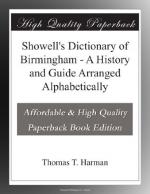Postal Notes.—In 1748 letters were conveyed from here by post on six days a week instead of three as previously. To help pay the extra expense it was enacted that any person sending letters by private hands should be liable to a fine of L5 for every letter.—In 1772 a letter sent by “express” post was charged at the rate of 3d. per mile, with a 6d. fee for each stage and 2s. 6d. for the sending off.—Mails for the Continent were made up fortnightly, and once a month for North America. —In 1780, when James Watt was at Truro and Boulton at Birmingham, it took thirteen days for the one to write to and get an answer from the other, and on one occasion a single letter was eleven days on the road. —A local “penny post” was commenced September 4, 1793, but there was only one delivery per day and the distance was confined to one mile from the office.—The postage on letters for London was reduced to 7d., December 1, 1796, but (and for many years after) if more than one piece of paper was used the cost was doubled.—In 1814 the postage of a letter from here to Warwick was 7d.—The system of “franking” letters was abolished in 1839. This was a peculiar privilege which noblemen, Members of Parliament, and high dignitaries possessed of free postage for all their correspondence, and very strange use they made of the privilege sometimes, one instance being the case of two maidservants going as laundresses to an Ambassador who were thus “franked” to their destination. This privilege cost the Post office about L100,000 a year. —The penny postage system of Rowland Hill came into operation January 10th, 1840.—In 1841-2 there were only two deliveries per day in the centre of the town, and but one outside the mile circle, an extra penny being charged on letters posted in town for delivery in the outer districts.—The collection of a million postage stamps for the Queen’s Hospital closed Sep. 5, 1859.—Halfpenny stamps for newspapers were first used in 1870.—The telegraphs were taken to by the Post Office in 1876, the first soiree in celebration thereof being held at Bristol Street Board School, Jan. 29, 1877.—The Inland Parcels Post came into operation on August 1, 1883, the number of parcels passing through our local office being about 4,000 the first day, such trifles as beehives, umbrellas, shoes, scythes, baskets of strawberries, &c., &c, being among them. The number of valentines posted in Birmingham on Cupid’s Day of 1844 was estimated at 125,000 (the majority for local delivery), being about 20,000 more than in the previous year.
Power.—That the letting of mill-power would be a great advantage to hundreds of the small masters whose infinitude of productions added so enormously to the aggregate of our local trade was soon “twigged” by the early owners of steam engines. The first engine to have extra shafting attached for this purpose was that made by Newcomen for a Mr. Twigg in Water Street (the premises are covered by Muntz’s metal works now), who, in 1760, advertised that he had “power to let.”




